Pilot project "Trade for sustainable economic management"
Short description

Ecology and economy do not have to be in opposition but can be jointly improved to the benefit of crafts enterprises and the environment. Higher profitability through improved sustainability and resource conservation is the guiding theme. The realization of this is an essential aim of the pilot project "Trade for sustainable economic management", in which 75% of the costs are sponsored by the state. Additionally, further improvements for the environment and in regards to social issues in the commercial district Reinfeld Grootkoppel are to be achieved through the cooperation of crafts enterprises. The development of a comprehensive environmental management system according to EMAS II for a number of the participating crafts enterprises constitutes the grand finale of the two-year pilot project.
The sustainability strategy of the state Schleswig-Holstein underlines the planned objective with the focus "Working and producing". The Wirtschafts- und Aufbaugesellschaft Stormarn as well as the Chamber of Trade Lübeck support the Stormarn district as project partner in the implementation of this trend-setting pilot project.
Pilot project "Trade for sustainable economic management" in the commercial district Reinfeld Grootkoppel
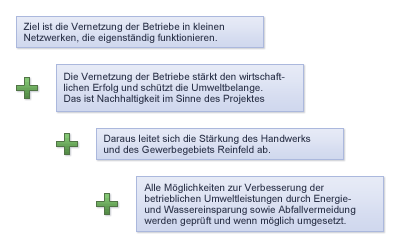
Introduction
Sustainable economic practices as well as ecological and social development are central components of the Agenda 21. Sustainable development follows the aim of achieving a balance between the economic, ecological and social interests of the individual people.
With the accession to the Climate Alliance and the resolution regarding the local Agenda 21, the Stormarn district has assumed responsibility for the initiation and implementation of sustainable development. The sustainability strategy of the state Schleswig-Holstein supports this objective with the focus "Working and producing". The state therefore supports the pilot project by providing 75% of the costs.
Objective
The aim of the pilot project focuses on the long-term strengthening of trade in the Stormarn district. At the centre of attention is: sustainability on the basis of greater environmental protection with the aim of higher profitability. The crafts enterprises are to be relieved and strengthened by means of improving operational environmental measures in the form of energy and water conservation as well as the prevention or reduction of waste.
Apart from the reduction of CO2 emissions as a contribution to the protection of global climate, the networking of enterprises is intended to demonstrate and utilize synergy effects. The integration of environmental protection measures and the networking concept into the internal management systems represents an essential contribution to the sustainability of trade in the Stormarn district. Furthermore, the Reinfeld Grootkoppel commercial district, which is particularly suited for the project by virtue of its high percentage of crafts enterprises and a balanced mix of different trades, is strengthened. Particularly the consideration of the networking aspect within a commercial district also enables the inclusion of social aspects.
Flyer concerning the kick-off event (PDF, 203 KB)
Project flow
For the implementation of the aforementioned objective, the pilot project is divided into four steps. The canvassing of enterprises takes place prior to these steps. With each step the enterprises pass through, the sustainability of the operational measures and the networking increases.
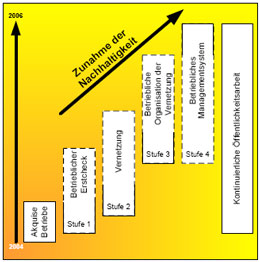
Step 1 Start in January 2004 and end in December 2004 Twenty participating enterprises, whose points of intersection with other enterprises are intensely examined, are included in the first operational check. Among others, the first check covers the analysis of energy and water use, the waste and sewage situation, purchasing, and hazardous materials and transport. Measures for, e.g., energy saving are derived from the analysis, discussed with the craftsmen and implemented. The implementation sets the stage for steps 2 to 4.
Step 2 Start in July 2004 and end in July 2005 The points of intersection with other crafts enterprises in the local surroundings were determined by means of the first check. Fifteen enterprises are included in the networking plans, as not all 20 enterprises will have a point of intersection in the local surroundings. Synergy through, e.g., collective purchasing, waste disposal or energy supply, is the goal.
Step 3 Start in January 2005 and end in December 2005 The anchoring of the points of intersection in the internal organization is necessary to ensure the sustainability of the networking. The development of stable nuclei, which can integrate additional enterprises in the surroundings, is planned for 12 enterprises. The integration develops local cooperation beyond the crafts enterprises and strengthens the local business environment.
Step 4 Start as soon as a business is interested and end in December 2005 Six enterprises are included in step 4, which, based on the first check, are developing a management system following the specifications of the Eco-Management and Audit Scheme and are further optimising their internal organization as well as their environmental protection measures according to economic aspects. Management systems systematize daily work, strengthen the strategic orientation of the enterprises, and help with the continuous performance improvement. With the introduction of a management system, the highest level of operational sustainability is reached.
Time schedule and coordination
The difficult economic situation of the skilled crafts sector requires efficient support in the search for possible savings. For this reason, the canvassing of enterprises in the chosen Reinfeld Grootkoppel commercial district already begins in January 2004. Subsequently the execution of the individual project stages is carried out. Based on experiences from other already completed environmental management projects, the total running time of the project was set at two years.
The project sponsorship is assumed by the Stormarn district. Meetings of the steering committee for the coordination and support of the pilot project take place accompanying steps 1 to 4. The steering committee consists of representatives of the state, the district, the Chamber of Trade, the District Craft Trades Association, and the advisers. As regards content, the work in the enterprises and their industry-wide cooperation are to be supported by workshops carried out by the consulting firms. Events are planned for the promotion of the project idea, which are to reach the regional press as well as specialist publications.
Project participants
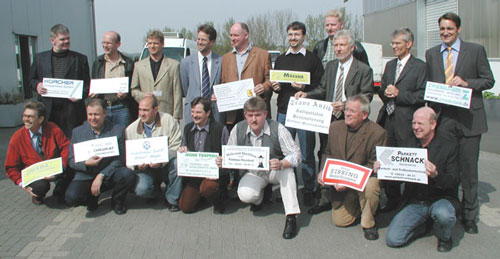
Photo: Representatives of the Reinfeld enterprises with Environment Minister Klaus Müller, District Administrator Klaus Plöger and Mayor Gerhard Horn during the kick-off event.
.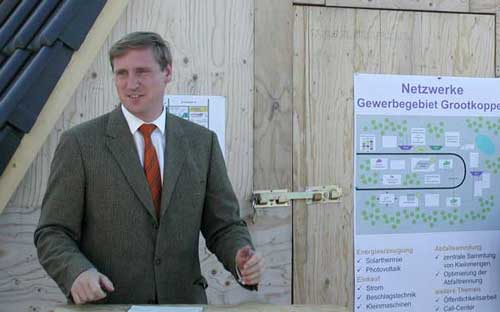
In his interim statement on September 5th, 2005, after 16 months of project work, Environment Minister Christian von Boetticher considers the project a success.
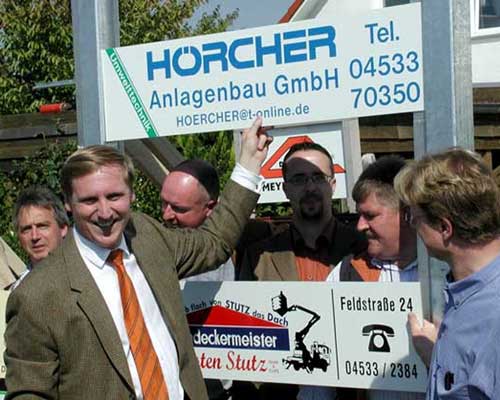
So far, the following Reinfeld crafts enterprises and the builder's yard of the city of Reinfeld have already participated in the pilot project:
- A. Beuck Tiefbau KG (civil engineering)
- Bruns Melktechnik (milking technology)
- Carl von Elling GmbH (profile and metall sealings)
- Dachdeckerei Michael Schäfer GmbH (roofer service)
- Druckerei Masuhr (printeries)
- Elektroinstallateurmeister Rosenau (electronic installations)
- Elektro Schmidt (one-line business, electronic installations)
- EVW Wegener (IT and electronic trade)
- Fliesenlegermeister Uschkurat (tiler service)
- Hörcher Gesellschaft für Anlagenbau und Energiesysteme mbH (plant engineering and energy systems)
- Holz- und Dachbau GmbH Raddatz (woodworks, roofer)
- LIWEBA Lichtwerbeanlagenbau GmbH (building of luminous advertising plants)
- NOVATECH (maintenance and reparation, heating technology)
- Parkett-Schnack GmbH (parquet recliner)
- Schlosserei und Metallbau Zwiebelmann GmbH (metalwork shop)
- T + B Treppen und Bauelemente (stairways and building elements)
- Tischlerei Rosenke (joinery)
- Teletronic GmbH (alarm and security systems)
- Trave Antik (antiquities, restoration, antique furniture, etc.)
- Treppenbau Voß (stairway building)
- Bauhof der Stadt Reinfeld (builder’s yard of the city of Reinfeld)


 District of Stormarn, Department of Environment
District of Stormarn, Department of Environment